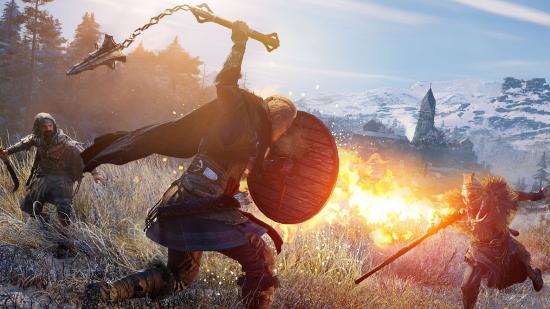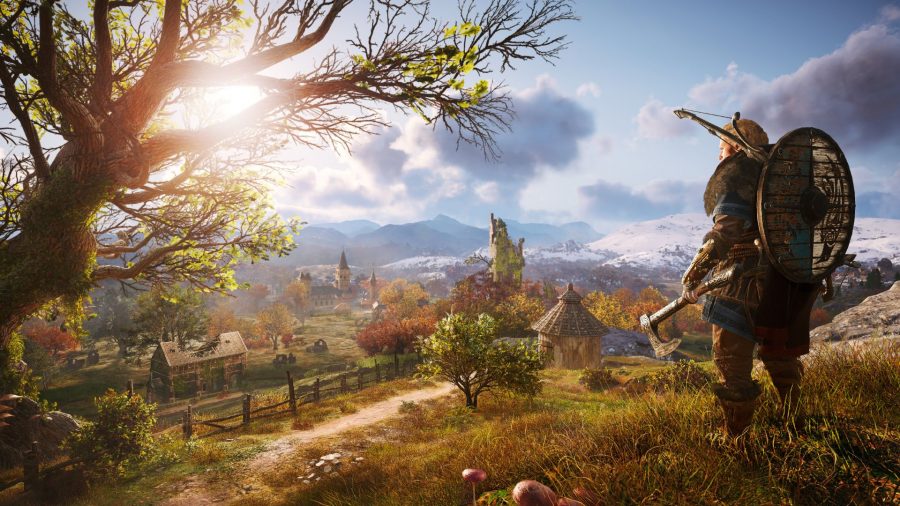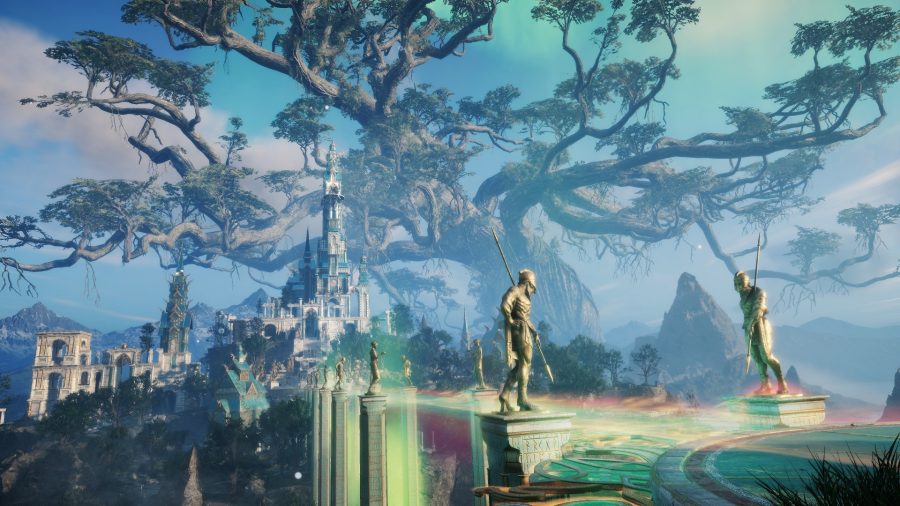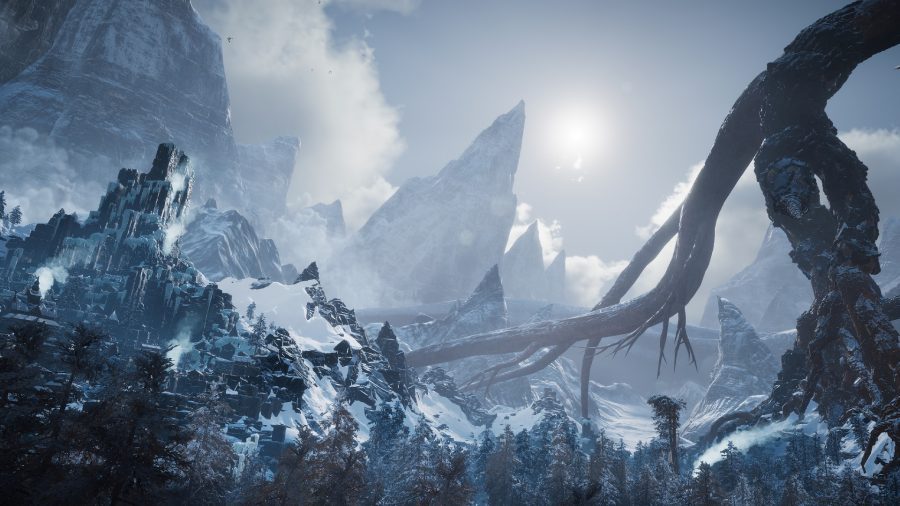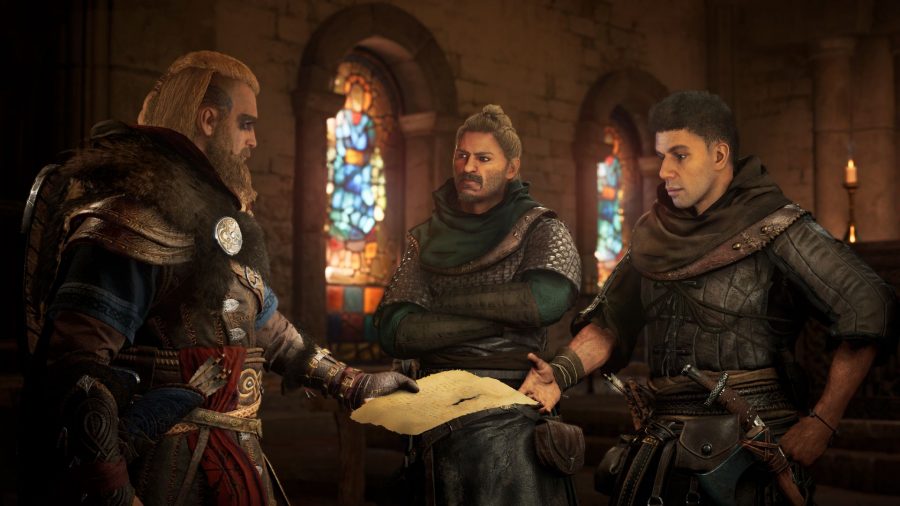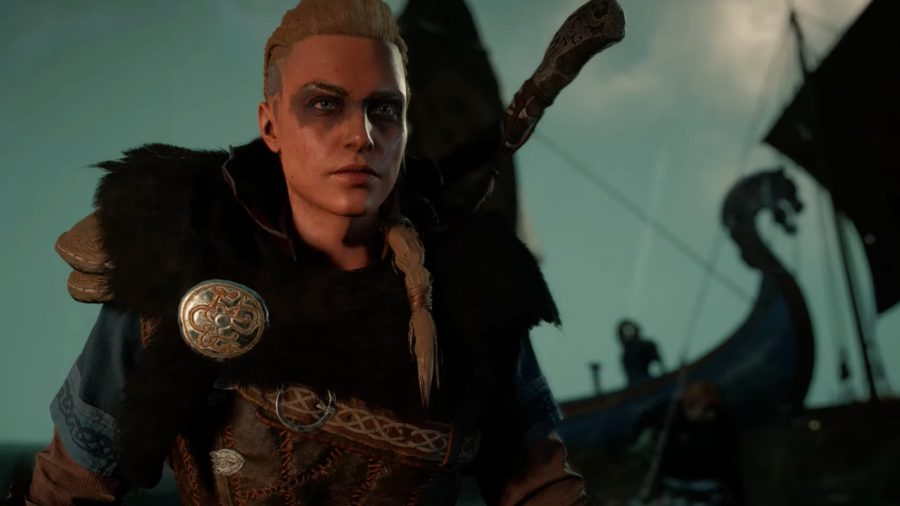Assassin’s Creed has changed. What began as an exciting and original historical action adventure series in 2007 had long since declined into formula and listlessness a decade later, obliging a reboot with 2017’s Assassin’s Creed Origins.
The new course embraced RPG mechanics and a heavy dose of fantasy – even beyond the long-running thread of a hyper-advanced ‘First Civilisation’. Origins’ successor Odyssey – a gorgeous, epic romp around the Peloponnesian War and Greek mythology – was even better received, and we’re now a little over a month away from plundering (or perhaps, peacefully settling) Dark Age England as a Viking raider named Eivor in this year’s Assassin’s Creed Valhalla.
So what to expect this time around? Jordan has gotten his hands on the game twice now – once to drink and battle-rap, and most recently, to play an awful lot of dice – and had plenty of questions to ask of game director Eric Baptizat, as did I, wearing my hat as PCGN’s history nerd. Topics covered include the return of social stealth, the Norse and British mythological elements, and the nuanced depiction of such historical figures as Alfred the Great.
For a lengthy but informative chat on all these topics and more, read on.

PCGamesN: Eivor is clearly presented more sympathetically than the clichéd view of Vikings as bloodthirsty savages, but that cliché isn’t wholly inaccurate – many Vikings did do horrible things. How are you navigating this conflict?
Eric Baptizat: When we started studying the Viking period, we realised that we and many other people had a caricatured idea of Vikings as very barbaric and violent. In fact, most battles were pretty violent whichever side you were on. And by looking at the Viking culture, we found that they were not only warriors, but also explorers, settlers, and farmers. For many of them the priority was taking care of their clan, and this is the approach that we’re pushing.
We want players to live the reality of the Norse in this period, to discover the meaning and responsibilities of being a clan leader: to raid, to steal resources to expand and protect your settlement, to build alliances with other territories in England. A goal we had from the beginning was for the player to live the journey that the Norse experienced: starting from Norway, a vast, arid environment, and coming to England to discover this rich and luxurious place, a perfect place to settle. But you need to build it, and you need to be ready to fight for it.
So it’s driven by necessity.
Exactly.
Still doesn’t seem like a moral thing to do, to take and settle land by force just because your home is less hospitable. Was it a challenge to portray this sympathetically?
We just tried to depict the reality of the period, without any adjustment or judgement. Your clan is facing this necessity, just as the other different territories [of England] are all fighting for their survival. We really want the player to be confronted with the harsh reality of this time, whatever side you’re on.
So can you set the stage for us?
The game starts in 873 AD. Vikings have already invaded England and some have settled. This is very important – you’re not the first to arrive, and the [country] is pretty much broken. We want the player to be immersed in this bloody time period and to play with it.
It’s a really interesting moment in history. Every territory has a different king, and they’re all just trying to survive, to strengthen themselves. You can try to make alliances [with them], but you’ll also meet Ragnar Lothbrok’s sons [including Ivar the Boneless and Ubba], and the boundaries between all these camps are not as clear as one might imagine. You’ll have a lot of variety in your relationships between the different Norse you’ll encounter – sometimes you might not follow their values, and some of them can become your enemies. We want the player to face those characters and decide what to do with them, so you’ll have dialogue choices to follow them, or to do your own thing based on what you think is right or wrong.

How about the other side? Alfred was one of the most enlightened kings of the time, but comes over pretty sinister in the trailers so far. Which view does the full game take?
We have shades of grey – good and bad elements – in most of our characters. With Alfred, he was king of Wessex at this time, and one of the guys that was most resistant to the Viking invasion. I won’t reveal all the relationships you might have with him, but he’s not somebody that is hostile by default. Your relationship is more complex than simply, ‘he’s a bad guy.’ The situation is more interesting than that.
Each territory has its own king and they vary in strength – some are really solid, like Alfred, others are weaker, and some are puppet kings placed by the Vikings. So we play with this variety of kings in England, and while Alfred is the most known, there’s this really interesting variety of side characters that we want the player to discover. Your relations with all the Norse and Anglo-Saxons are not always conflict, and not every king in England is going to attack a Viking on sight. There [can be] a lot of discussion to try and find a way to make peace and live together.
Read more: Check out the best open-world games on PC
There was an element of taking sides in the Athenian and Spartan conflict in Odyssey – how would you say they compare?
Er, they’re pretty different! In Odyssey you could decide which camp you can go and influence, but here it’s much more centralised around your settlement, and the alliances you can build that best help you to settle into this place. So it’s a totally different approach.
We meet Odin in the demo, and mythology has been a big part of Assassin’s Creed since its soft reboot with Origins. How does Valhalla depict these fantastical elements?
Mythology [and religion] was present in everyday life for the Norse at this time. An interesting [result] of that is the line between myth and reality is blurred – everything that happened to people was explained as being sent from the gods. So we play a lot with this, and you’ll see many elements [of life] as they correlate to Norse mythology.
Take Valka, the seer. She is a kind of shaman, and when you build a hut for her in your settlement, she allows you to go on a vision quest in which you’ll visit some of the worlds of Norse mythology. So you can access Asgard and Jotunheim.
Our interpretation of these things is mainly based on the Norse literature. There have been many different versions of [the Norse gods], which change their attitude or physical attributes, but we try to stay true to the Norse literary description, both for the gods and the different myths.
And again, how about the other side? Trailers have painted England as a land of mystery and magic – what elements of native British mythology have you discovered?
When studying this time period, we were surprised at just how rich England was. There are a lot of myths to play with, such as Black Shuck, the terrifying giant dog or wolf [that stalks East Anglia and may have been influenced by Viking myths of Odin’s black hound]. So we use a lot of stories like this to create events and, again, to play with the blurry line between myth and reality, so you can expect to encounter all those stories.
Related: How historically accurate is Assassin’s Creed Odyssey?
There’s also a lot of interesting history, especially after the Roman invasion. There are still a lot of Roman ruins in England, which you’ll be able to discover and visit, and see how people live in those places now. London, for example, is a very interesting city – obviously nothing compared to what we know today – and it had a very old Roman section that people would avoid because they were a bit scared of what it was.
On that note, I know you take your research seriously, but part of the reason it’s called ‘the Dark Ages’ is because it’s less well-documented than the classical world. Has that affected your process?
We’re working with a historian to give us the true version of the time period. Books [from around the same time] are a very, very interesting source – most that depict what happened were more recent accounts, written [after the fact] by monks. So, it’s not the true writing coming from this age, but we’re able to find many, many stories. We feed ourselves from this, and we build a world based on all the knowledge we can find from history and media. We don’t translate everything, but we select the highlights that we find most interesting and use them as a base to build each territory, each city, each story you’re going to encounter.
Turning to gameplay now, social stealth is back – what’s new this time, and why did you want to revive this feature?
As we studied the Vikings, we learned it was very important to them not to lose their men. So as they were moving around England, they used various tricks to escape detection rather than fight all the time. Suddenly the link with stealth was really obvious and totally makes sense. So when you enter an Anglo-Saxon city, you’re not noticed right away, but if you get too close to the guards, they will notice you.
For us, this was an opportunity to bring the cloak back [from previous Assassin’s Creed games]. It was always a bit of a caricature – like in all the movies, when people want to be disguised, they put on a cloak and suddenly nobody sees them, it’s funny. And so if you wear your cloak, you can use other tricks to pass the guards undetected.
Like in AC1, you can blend with a group of monks and pass any guard. You can also sit at a table to eat with a group of people, and guards won’t notice you. If you want to move, you can promise to buy them a drink, so they’ll follow you – wobbling a bit as they walk – and then you release them, saying ‘sorry, I won’t pay you’, and they’ll shout and try to attract attention. The guard will come to see what happened, and you can use this as a distraction.
So social stealth and stealth in general already makes a lot of sense in this universe – in some places you are accepted, in some places you are not welcome, and some are totally forbidden. We want you to experience this variety of situations and bring social stealth back into the game loop.
Breaking stealth doesn’t feel very consequential – we found almost no penalty for breaking cover and killing a few guards. How do you want stealth to feel in Valhalla?
We never wanted stealth to be mandatory. It’s a strategy that you can choose to use. What is interesting though, is that the more you progress, the more important things like social stealth and assassination with the hidden blade become for bypassing challenges.
For example, killing enemies in stealth will grant adrenaline tokens, which will allow you to trigger very powerful abilities. You can take the full frontal approach, but this will be very, very difficult for certain [set pieces]. If you have a stealth approach, though, you can collect adrenaline tokens as you eliminate enemies, and then when you enter a fight, you can trigger those very powerful abilities.
We also have a mechanic that enables you to assassinate even the hardest enemies in the game, but you need to unlock a skill, which triggers a timing-based mini-game during assassinations. If you succeed, you can kill even the most powerful enemies in one hit. The timing will be very difficult to master with them, but good players that love the stealth approach can kill enemies that they would never be able to fight, and thereby enter very difficult areas and steal the loot. So it’s something that becomes more popular the more you progress.
What we know: Here’s the Assassin’s Creed Valhalla release date
We want to let players express themselves, and find and use the strategies they prefer – this is really important. It’s funny: some players tell us ‘I never use stealth, I’m always fighting’, while for others, it’s the opposite. And many players will change between stealth and combat without even realising it – they’ll naturally change their strategies when they face new challenges, adapting to the situation.
